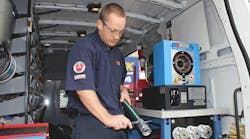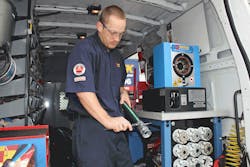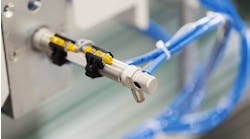The International Fluid Power Society (IFPS), Cherry Hill, N.J., has released newly revised Mobile Hydraulic Mechanic, Mobile Hydraulic Technician, and Connector and Conductor Certification Tests, in its efforts to provide the most complete coverage of technologies relevant to the fluid power industry.
The new certification tests will include new study manuals. Certification requires successful completion of a three-hour written and a three-hour job performance (hands-on) test. IFPS Members may download complimentary study manuals; non-members may purchase the manuals.
IFPS defines a Connector and Conductor professional as one who fabricates, assembles, and tests hose and assemblies. The Connector and Conductor certification is not applicable to automotive hydraulic/pneumatic brake and power steering assemblies or aerospace equipment.
The Mobile Hydraulic Mechanic Certification tests an individual’s knowledge on the fabrication, assembly, service, maintenance, and testing of mobile hydraulic equipment. The mechanic must understand hydraulic symbols, reads system schematics, and should be skilled in using hand tools, power tools, micrometers, and testing equipment.
The IFPS Mobile Hydraulic Technician certification tests an individuals’ knowledge on fluid power theory and related knowledge to test and troubleshoot operational mobile hydraulic systems and applications. A Mobile Hydraulic Technician must be able to read mobile schematics, perform basic cylinder and hydraulic motor calculations and must be able to supervise system installations and commissioning.
“The IFPS strives to keep pace with changing fluid power and motion control technologies; panels of subject matter experts have been hard at work revising these certifications,” said Mark Perry, CFPS, IFPS president. “Many companies and individuals have spent countless hours researching and re-constructing these certifications to contain the most complete coverage of technologies relevant to the fluid power industry.”
The International Fluid Power Society is the only organization that provides comprehensive technical certification offerings for all professionals in the fluid power and motion control industry, with 23 different certifications currently offered. These certifications cover diverse job descriptions within the industry including mechanic, technician, specialist, and engineer. The IFPS has more than 10,000 active certifications throughout the United States and in many countries around the world.
Visit www.ifps.org for further information.


